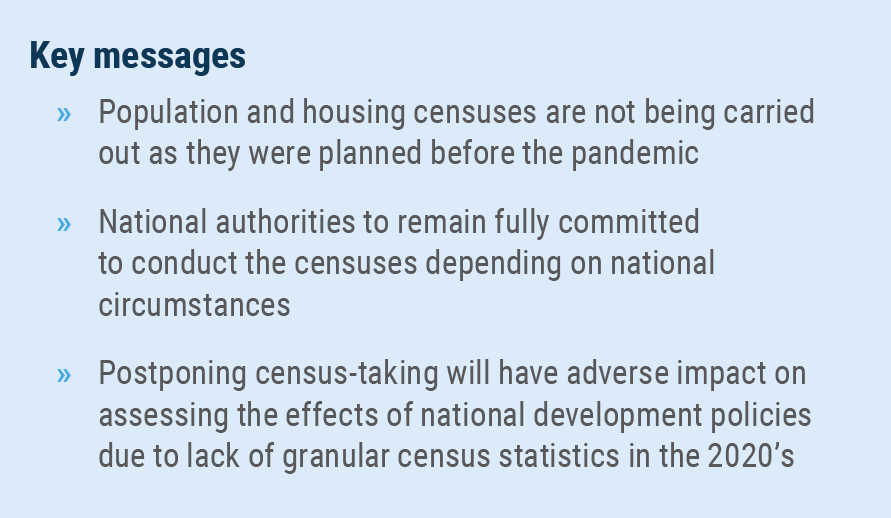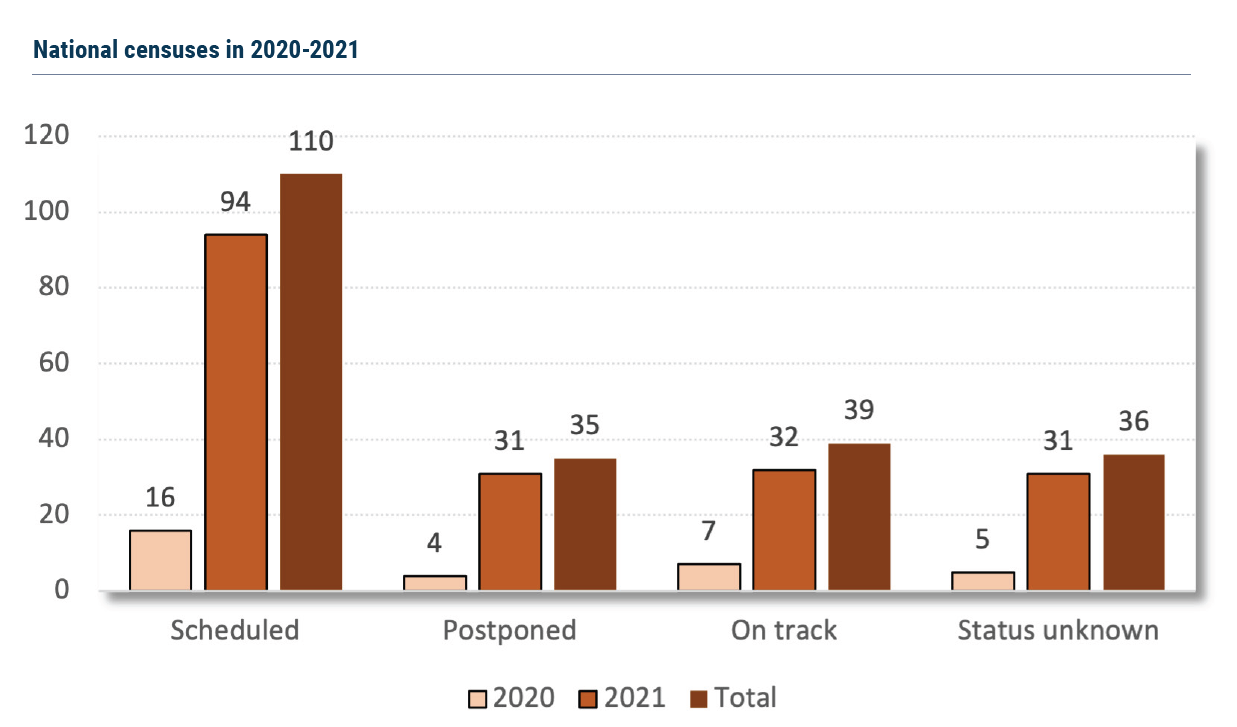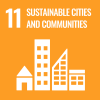
 Every ten years, the United Nations launches a census decade – everybody counts and should be counted. During that period, each country should produce at least one full count of its population and housing units. The 2020 census round was launched by ECOSOC, a main UN body, in 2015. The 2020 World Programme recognizes population and housing censuses as one of the primary sources of data needed for formulating, implementing and monitoring policies and programmes aimed at inclusive socioeconomic development and environmental sustainability. It further recognizes population and housing censuses as an important source for supplying disaggregated data needed for the measurement of progress of the 2030 Agenda for Sustainable Development, especially in the context of assessing the situation of people by income, sex, age, race, ethnicity, migratory status, disability and geographic location, and other characteristics. Finally, it urges all member States to conduct at least one population and housing census, or otherwise generate small-area census statistics, at least once in the period 2015 – 2024. In facilitating the implementation of the 2020 World Programme, the United Nations issued the Principles and Recommendations for Population and Housing Censuses, Revision 3 (2015), accompanied be a set of handbooks, guidelines and manuals. One of the UN principal recommendations calls on all countries/areas to conduct their population and housing censuses in the years ending in “0” or “1” to ensure as much as possible regional and international comparability of census statistics. For the 2020 Round of Population and Housing Censuses, these years are 2020 and 2021. The first cases of COVID-19, a disease caused by a coronavirus called SARS-CoV-2, began to be recorded and documented in December 2019. In March 2020, the World Health Organization declared COVID-19 a global pandemic. The full impact of COVID-19 pandemic on all the dimensions of social, economic, environmental and psychological wellbeing of the world population is certainly immeasurable and difficult to fully quantify; the impact the pandemic caused on conducting population and housing censuses in the years 2020 and 2021 refers to the occurrence and quality of census-taking, comparability with previous censuses, interpretation of resulting census statistics, the future of census-taking and on the availability of reliable, disaggregated statistics that are critical for monitoring the implementation of development policies and their effects in the 2020’s. With the vast majority of countries opting to conduct a traditional census, whereby each household is approached to provide relevant information, either by enumerators using tablets or paper questionnaires, of self-enumerating using internet, the measures undertaken by countries to mitigate the impact of the pandemic – lockdowns, shutting down non-essential services, working from home, to name a few – adversely impacted the preparations and conduct of population and housing censuses. This resulted in postponing census preparations and activities or extending the enumeration period to unprecedented lengths (in some cases almost a year) thus negatively impacting the quality and reliability of census statistics. The DESA/Statistics Division conducted a series of surveys since the onset of the pandemic and conducted an expert group meeting (February 2021) to assess the adverse impact of the COVID-19 pandemic on the implementation of the 2020 World Programme on Population and Housing Censuses, and in May 2021 introduced an online dashboard as an instrument for constant updates of national census-taking https://unstats.un.org/unsd/demographic-social/census/COVID-19/.
Every ten years, the United Nations launches a census decade – everybody counts and should be counted. During that period, each country should produce at least one full count of its population and housing units. The 2020 census round was launched by ECOSOC, a main UN body, in 2015. The 2020 World Programme recognizes population and housing censuses as one of the primary sources of data needed for formulating, implementing and monitoring policies and programmes aimed at inclusive socioeconomic development and environmental sustainability. It further recognizes population and housing censuses as an important source for supplying disaggregated data needed for the measurement of progress of the 2030 Agenda for Sustainable Development, especially in the context of assessing the situation of people by income, sex, age, race, ethnicity, migratory status, disability and geographic location, and other characteristics. Finally, it urges all member States to conduct at least one population and housing census, or otherwise generate small-area census statistics, at least once in the period 2015 – 2024. In facilitating the implementation of the 2020 World Programme, the United Nations issued the Principles and Recommendations for Population and Housing Censuses, Revision 3 (2015), accompanied be a set of handbooks, guidelines and manuals. One of the UN principal recommendations calls on all countries/areas to conduct their population and housing censuses in the years ending in “0” or “1” to ensure as much as possible regional and international comparability of census statistics. For the 2020 Round of Population and Housing Censuses, these years are 2020 and 2021. The first cases of COVID-19, a disease caused by a coronavirus called SARS-CoV-2, began to be recorded and documented in December 2019. In March 2020, the World Health Organization declared COVID-19 a global pandemic. The full impact of COVID-19 pandemic on all the dimensions of social, economic, environmental and psychological wellbeing of the world population is certainly immeasurable and difficult to fully quantify; the impact the pandemic caused on conducting population and housing censuses in the years 2020 and 2021 refers to the occurrence and quality of census-taking, comparability with previous censuses, interpretation of resulting census statistics, the future of census-taking and on the availability of reliable, disaggregated statistics that are critical for monitoring the implementation of development policies and their effects in the 2020’s. With the vast majority of countries opting to conduct a traditional census, whereby each household is approached to provide relevant information, either by enumerators using tablets or paper questionnaires, of self-enumerating using internet, the measures undertaken by countries to mitigate the impact of the pandemic – lockdowns, shutting down non-essential services, working from home, to name a few – adversely impacted the preparations and conduct of population and housing censuses. This resulted in postponing census preparations and activities or extending the enumeration period to unprecedented lengths (in some cases almost a year) thus negatively impacting the quality and reliability of census statistics. The DESA/Statistics Division conducted a series of surveys since the onset of the pandemic and conducted an expert group meeting (February 2021) to assess the adverse impact of the COVID-19 pandemic on the implementation of the 2020 World Programme on Population and Housing Censuses, and in May 2021 introduced an online dashboard as an instrument for constant updates of national census-taking https://unstats.un.org/unsd/demographic-social/census/COVID-19/.  The graph above provides a succinct illustration of the current state of the census taking that the DESA/STAT dashboard presents. Out of 110 national censuses for which data were available and that were scheduled (before the pandemic) to take place in 2020 and 2021, 71 (65%) are either postponed or with unknown status, and 39 were conducted or are planned to be conducted by end of 2021, with a number of them significantly extending the census enumeration period. Consequently, the capacity to accurately and consistently assess the development and the impact of developmental policies at national and especially sub-national levels may be hampered by the lack of granular and comprehensive statistics that only the population and housing census provides. Census data are essential for accurate planning for service delivery in terms of locating and building hospitals, schools and transportation infrastructure; allocation of budgetary resources; delineation of electoral districts; monitoring the implementation of 2030 Sustainable Development Agenda at lower civil divisions’ areas, to name just a few. In that context, it is necessary to urge all Member States to remain firmly committed to the goals of the 2020 World Population and Housing Census Programme, and to continue planning and preparing to conduct a population and housing census when the national conditions permit, taking into account international and regional recommendations and using recently developed methodological solutions and successful national practices. It is recognized that the decisions related to census-taking at the national level are subject to regular assessment of the pandemic and other relevant conditions in the country. The DESA/Statistics Division surveys documented that a number of countries already postponed their census more than once, underscoring the fact that countries indeed continuously adjust decisions related to the census according to national epidemiological circumstances. It is therefore imperative for UNDESA to continue monitoring census-taking worldwide and reporting on the implementation of the 2020 World Population and Housing Census Programme to the relevant UN bodies.
The graph above provides a succinct illustration of the current state of the census taking that the DESA/STAT dashboard presents. Out of 110 national censuses for which data were available and that were scheduled (before the pandemic) to take place in 2020 and 2021, 71 (65%) are either postponed or with unknown status, and 39 were conducted or are planned to be conducted by end of 2021, with a number of them significantly extending the census enumeration period. Consequently, the capacity to accurately and consistently assess the development and the impact of developmental policies at national and especially sub-national levels may be hampered by the lack of granular and comprehensive statistics that only the population and housing census provides. Census data are essential for accurate planning for service delivery in terms of locating and building hospitals, schools and transportation infrastructure; allocation of budgetary resources; delineation of electoral districts; monitoring the implementation of 2030 Sustainable Development Agenda at lower civil divisions’ areas, to name just a few. In that context, it is necessary to urge all Member States to remain firmly committed to the goals of the 2020 World Population and Housing Census Programme, and to continue planning and preparing to conduct a population and housing census when the national conditions permit, taking into account international and regional recommendations and using recently developed methodological solutions and successful national practices. It is recognized that the decisions related to census-taking at the national level are subject to regular assessment of the pandemic and other relevant conditions in the country. The DESA/Statistics Division surveys documented that a number of countries already postponed their census more than once, underscoring the fact that countries indeed continuously adjust decisions related to the census according to national epidemiological circumstances. It is therefore imperative for UNDESA to continue monitoring census-taking worldwide and reporting on the implementation of the 2020 World Population and Housing Census Programme to the relevant UN bodies.
 Welcome to the United Nations
Welcome to the United Nations

